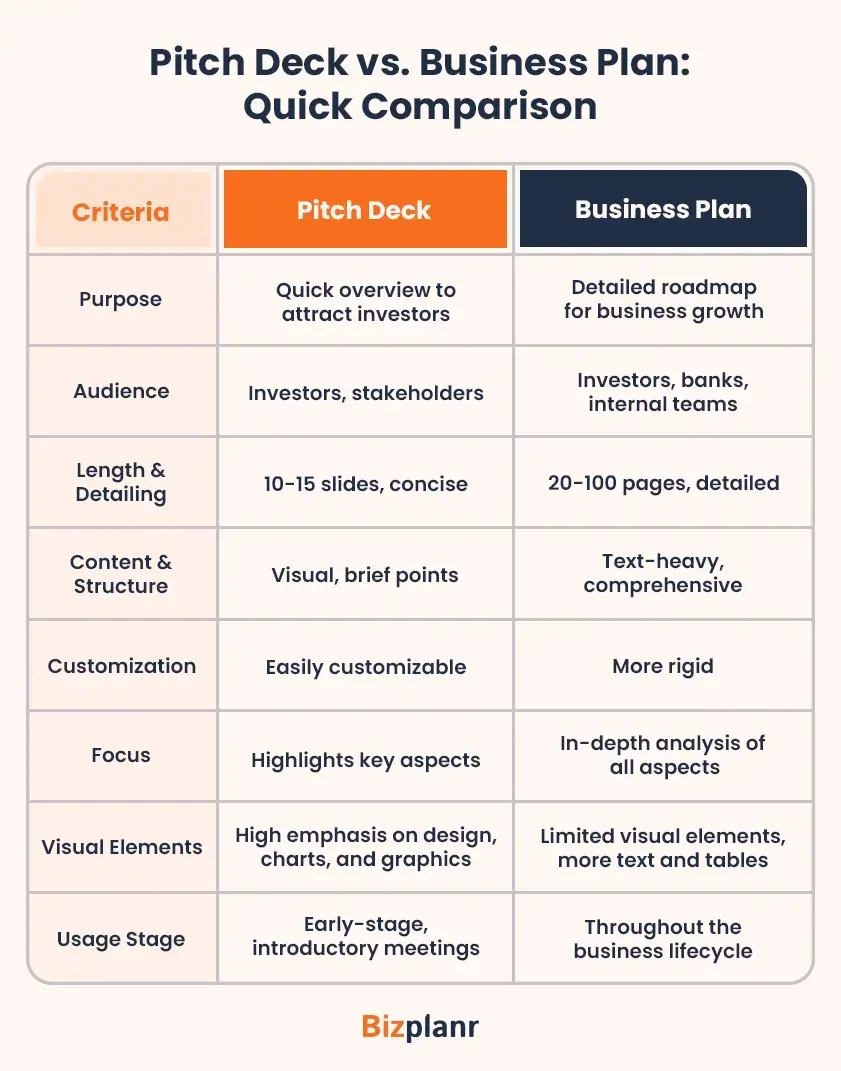A business plan and pitch deck are the two most important documents one needs while setting up a new startup.
However, both these documents hold a separate power, and using them judiciously in the right situation can get you excellent results.
So how do you know when to use what? Besides, how are these documents different?
We will learn all about it in this blog post called Pitch Deck vs Business Plan.
Gear up as we are about to dive in. But before that let’s just understand what a pitch deck and a business plan are.
What is a pitch deck?
A pitch deck is a concise visual presentation of your business idea. It is used to capture the attention of potential investors and stakeholders and persuade them of your business potential.
Pitch decks convey essential business information by emphasizing storytelling and visual engagement. They offer an overview of your business by narrating the problem it solves, the solutions it provides, its revenue model, market opportunity, key financials, and the people on the team.
A business pitch deck focuses on brevity and crispness to keep the audience hooked.
What is a business plan?
A business plan is a comprehensive document outlining your business’s goals, strategies, and financials. This living document offers a roadmap to help you structure and grow your business systematically.
Business plans are extremely detailed covering sections such as market analysis, competitors analysis, products and services overview, business strategies, operations, financials, and managerial team.
These documents guide internal operations, streamline the business finances, and help secure funding.
Related: Defining Business Plans: Purpose, Components, and Types
Key Difference: pitch deck vs business plan
Let’s now understand the differences that make these two business planning documents different.
1. Purpose
A pitch deck helps introduce your business idea quickly and efficiently to your readers. It piques the readers' interests and persuades them to learn more about your business. Pitch decks are perfect when you want people(especially potential investors) to gather essential business details without boring them with in-depth detailing and documentation.
Business plans, on the other hand, are meant to offer an in-depth overview. It gives readers a roadmap explaining how you will structure, set up, and grow your business. Business plans prove the viability of your business idea and assist the readers in making informed decisions.
2. Audience
A pitch deck presentation is mainly designed for potential investors and venture capital firms to secure equity funding. However, that’s not it. Since the core purpose of the pitch deck is to familiarize the readers with your business concepts, anyone who wants to understand your business can be its audience.
Similarly, business plans are also intended for a vast audience. From traditional banks to angel investors, business partners, and internal teams— business plans cater to a large audience fulfilling different objectives.
3. Length and detailing
Pitch decks succinctly summarize your key business details in 10-15 slides. It focuses on covering high-value points of your business plan through highly engaging crisp content. That said, a slide deck focuses on brevity instead of in-depth detailing.
Business plans, however, can vary anywhere between 2-100 pages in length. Different types of business plans have different lengths depending on the objective, complexity, and level of detailing it demands.
For instance,
- Lean and startup business plan: 1-2 pages
- Growth business plan: 8-10 pages
- Traditional plan: 20-40+ pages
Traditionally business plans outline every aspect and nitty-gritty details of your business offering its micro analysis.
4. Content and structure
A compelling pitch deck is highly visual and includes minimum content. Instead of paragraphs, it uses crisp liners to convey highly valuable information.
While a pitch deck can be structured any way, here’s a format that will help you cover all the essential points engagingly.
- Title slide
- Problem
- Solution
- Market Opportunity
- Revenue model
- Traction
- Sales and Marketing Strategies
- Managerial team
- Financials
- Funding demand
Business plans, on the other hand, are heavy on textual content. It details each aspect of business opportunity, strategies, and finances offering a long-term overview of your business.
In terms of structure, most business plans follow this outline:
- Executive summary
- Business description
- Market and competitor’s analysis
- Products and services overview
- Marketing and sales strategies
- Operations plan
- Management team
- Financial plan
- Appendix
5. Customization
Pitch decks are highly customizable. Depending on the audience, it’s easy to modify the context and details important for that particular reader.
Business plans are also customizable. However, it’s difficult to change your traditional plans for different audiences. It encapsulates all the details offering a micro perspective of an entire business.
That’s it. You now understand the core differences that differentiate business plans from pitch decks. However, let’s now understand the practical use cases of these business planning documents.
Pitch deck or business plan — when will you need them?
Both, pitch decks and business plans are extremely useful business planning documents. These documents can help you secure funding, engage the stakeholders, and effectively communicate your goals to the internal team.
However, do you need both of these documents always?
For instance,
- While approaching the investor, do you need a pitch deck or a business plan?
- What do you use when you want to guide an internal team?
- Will the pitch deck get you a co-founder?
Well, let’s get our answers.
| Situation | Pitch Deck or Business Plan | Why |
|---|---|---|
| Networking and pitch competitions | Pitch deck | Quickly introduces your business idea and marks a remarkable first impression. |
| Initial funding | Pitch deck | Piques the investors' interest, validates the business idea, and secures your funding. |
| Long-term strategic planning | Business plan | Outlines the business objectives, explains the strategy and offers a roadmap to achieve your goals. |
| Communicating with existing partners and co-founders | Business plan | Gets everyone on the same page by detailing the execution approach. |
| Attract partners and co-founders | Pitch deck | Piques their interest by engagingly conveying the business concept and value proposition. |
| Growth planning | Business plan | Allows you to plan for growth and subsequent business phases by diving deep into different business aspects. |
| Significant funding | Business plan | Wins investors' confidence in your business, its practicality, and its ability to attain profits. |
| Funding from traditional banks | Business plan | Because they demand a business plan. |
That pretty much explains how you can shuffle between a pitch deck and a business plan in different business situations.
Which is more important—pitch deck or a business plan
Do you need both a business plan and a pitch deck?
Yes, you do.
It’s often argued that pitch decks are more important or useful than a business plan. Well, it’s only a partial truth.
A pitch deck has a higher chance of being read till the end. A well-crafted deck can help you secure conversations and further meetings with the investors. And in most cases also an initial funding.
However, there is no base for a pitch deck to exist without a detailed business plan. You see pitch decks are nothing but a concise visual representation of your business plan.
When you write a business plan, you go through an immersive process that helps you think about the micro nuances of your business in detail. This understanding will prepare you for a pitch that will eventually land you funding.
Remember, a pitch deck can simply get you a meeting with an investor. However, you will need a business plan to win their confidence and prove your preparedness for this business.
That said, a business plan and a pitch deck are equally important for any business.
Create your business plan and pitch deck with AI
Now that you are ready to create your business plan and a pitch deck, let’s leverage AI to develop these documents.
Generative AI tools like Chat GPT, Jasper, Dalle E.2, and many others can help you write content, create images, and develop presentations for your business documents.
However, instead of using those tools, we recommend using dedicated business planning tools with AI functionalities. Such tools offer end-to-end AI assistance in creating compelling pitch decks and business plans for a small subscription fee.
Want to experiment a bit before committing to any paid resources?
Test Bizplanr AI business plan generator for free and get a unique business plan for your business crafted from scratch.
Get Your Business Plan Ready In Minutes
Answer a few questions, and AI will generate a detailed business plan.
Frequently Asked Questions
Is a business proposal the same as a pitch deck?
No, a business proposal and a pitch deck are different. A business proposal outlines the terms and details of a particular project. Pitch deck, on the other hand, is a visual presentation of your business idea and is used to secure meetings with the investor.
Can a pitch deck replace a business plan?
Not really. A pitch deck covers only the high-value points of a business plan. It doesn’t encapsulate the depth and breadth of each topic covered in a business plan. A pitch deck familiarizes the audience with a business idea while a plan is required to educate them in detail.
Can I use the same information from my business plan in my pitch deck?
Yes. However, you need to structure the content appropriately for a pitch deck. You cannot use paragraphs to present information in a pitch deck. It needs to be crisp, short, and highly engaging.
How do I decide whether to create a pitch deck or a business plan first?
Creating a business plan first makes more sense. This will help you gather a nuanced understanding of each business aspect in detail which will come in handy while preparing a pitch deck.
Can a business plan help me if I’m not seeking funding?
Yes, a business plan can help whether or not you seek funding. It serves as a roadmap that will tell you what to do, how to proceed, and how to drive your business toward growth. It will help streamline the processes, make communication easier, and allow you to track the actuals with your set KPIs. The benefits of having a business plan are far more than securing funding.






